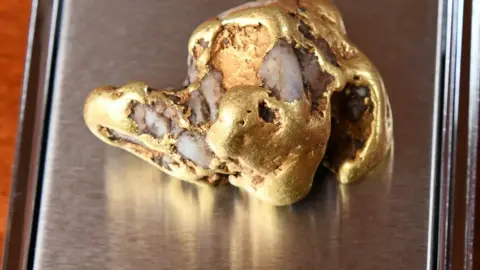Giant gold nugget found in Scottish river
 Paul Jacobs
Paul JacobsA gold nugget - claimed to be one of the biggest ever found in Britain - is reported to have been discovered in a Scottish river.
The gold, dubbed the Douglas Nugget, weighs 85.7g, and has been estimated to be worth more than £50,000.
It was discovered two years ago but has remained secret until now.
The man who found it wishes to remain anonymous and the exact location of the river where the nugget was situated is also being kept under wraps.
Gold expert Leon Kirk, from Gold Panning Supplies UK, said: "This is a very exciting and unprecedented find.
"But the nugget's rarity means it is very hard to put a price on it.
"I would say it is worth at least £50,000 but, as it's rarer than an Aston Martin or a Faberge egg, a billionaire could easily come along and pay a lot more for it.
"Historically, it is off the Richter scale."
 Paul Jacobs
Paul JacobsThe man who found it, who is in his 40s, said he came across it by "sniping" - which sees gold hunters don a dry suit and snorkel before lying face down in a river.
He said he had discovered it while out searching with a friend and had not initially realised how big it was but when they did it provoked a reaction of delight.
"I took off my glove and picked it up, jumped out of the water and screamed 'bingo!' to my friend," he said.
"We were both stunned and couldn't believe it. I've never seen anything like it in my lifetime."
The owner is currently unsure what to do with his nugget, but is keeping it in a safety deposit box in the meantime.
Mr Kirk said he hoped it would end up being purchased by a British museum, although legally it could have to be handed over to The Crown Estate.
He suggested anyone else interested in learning how to look for gold should head to the "Mecca of gold-panning" at Wanlockhead in Dumfries and Galloway.
Dr Neil Clark, author of Scottish Gold: Fruit Of The Nation and curator at The Hunterian, University of Glasgow, said it was difficult to say if the nugget could have broken off from a larger chunk.
 Paul Jacobs
Paul Jacobs"The rounded edges of the piece indicate that it has certainly been in the watercourse for a while," he said.
"The size of the nugget suggests that it probably did not travel far, though."
A number of other large nuggets have been found in British waters with a 59g lump discovered in Cornwall in 1808.
In 2016, it emerged a 97g nugget had been found off the coast of Anglesey which was thought to have come from a ship which sank nearby.
A year earlier a nugget reckoned to be worth about £10,000 was found in the south of Scotland.

Analysis: Dr Neil Clark, author Scottish Gold: Fruit of the Nation
 Paul Jacobs
Paul JacobsIt is not just unusual, it is the largest nugget, by far, to have been found in Britain for more than 500 years, so it is also a very exciting find in a historical sense.
Gold is not easy to find in Scotland.
There are a number of places where licences can be readily obtained and you can prospect for small flakes of gold.
If you find more than half a gram of gold after a day's work, you are doing well.
Gold in Scotland can be formed by a multitude of processes.
As the large nugget encapsulates pieces of milky quartz, it is likely that the gold accumulated in a quartz vein, possibly by deep hydrothermal activity related to mountain building over 350 million years ago.
The source of the gold is from hot acid waters dissolving minerals accumulated in sediments and other rocks as they are put under pressure during mountain building, sometimes related to the emplacement of large bodies of molten rock (for example, granite magma).

